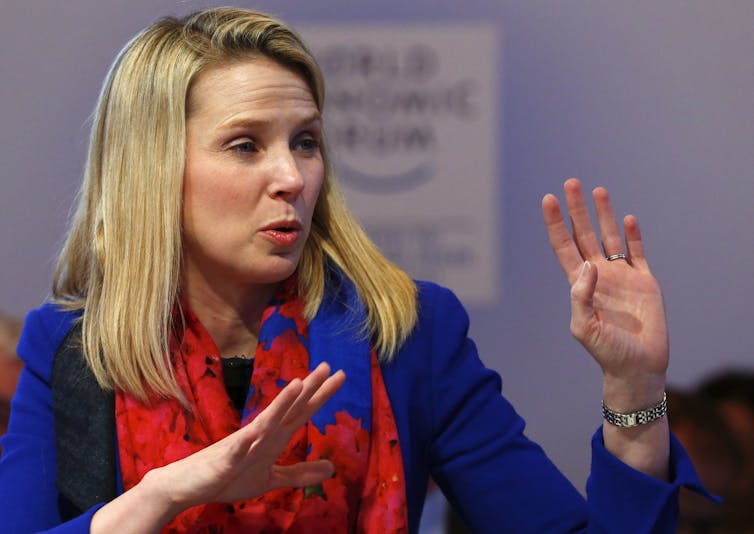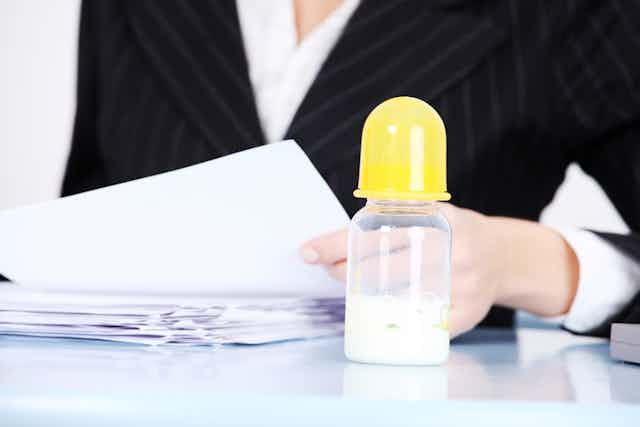The recent decision by Yahoo chief executive Marissa Mayer to take “limited parental leave” once she gives birth to twins invoked a strong reaction about “proper” motherhood. What seems to have annoyed the public most is that she will take too little time off and says she will remain “dedicated to both [her] family and Yahoo”.
Mayer is breaking the social norm by managing her family and work as most male CEOs do: by leaving childcare to others. Although more companies are starting to offer shared parental leave, only a few CEO dads opt to care for children full time. But men are judged differently when it comes to parenthood.
The ideals about motherhood and fatherhood are based on different social assumptions about gender roles. In the 1980s, people in the UK believed that mummy should be at home, and daddy should be “working out there”. Over the past 30 years, there has been a steady decline in this view. In 2012, only one person in eight believed this should be the case. According to NatCen research, 30% still think that pre-school children suffer if their mother works (down from 46% in 1989), and 27% that family life suffers when the woman is in a full-time job (down from 42%).
More and more parents of young children expect to “have it all” – maintaining a family and a career. But many cannot as managers increasingly expect employees to donate off-hours and long days at work appear as the best way of contributing to the society.
Different groups are affected in different ways by this expectation. Many parents – mothers in particular – face difficult challenges as they balance demanding work and commuting schedules with increasing familial responsibilities. In fact, motherhood remains one of the main determinants of women’s inactivity in the labour market. For most men the opposite is true.
Work-family policies set the rules of the game
Mayer is a chief executive – not only does she have the purchasing power to outsource childcare, she also has the power to challenge the workplace culture of “presenteeism” and long hours.

Governments and employers make choices in whether and how to support parents. These have consequences, meaning it is still much harder to be a “working mother” and an “active father” in some countries than others.
It’s each country’s government policies around leave, including sick leave, childcare and flexible working that create the contexts within which employers operate. These can either bolster or undermine parents’ possibility to ask for and use these rights and options.
Public policies that support families to work, and are closely connected to ideals of gender equity, prevail in social-democratic countries such as Sweden, Norway and Denmark. In this policy culture, a “working mother” and an “active father” are a standard and both are expected to stay in the labour market across their life course – this significantly shapes their prospects for adequate income during working lives and into retirement.
In these countries, paid parental and sick leave are offered to all parents as an individual right and public childcare services have been maintained as a collective right and public good. In Sweden, for example, the government also introduced a gender equality bonus, giving a higher compensation when fathers use parental leave – in addition to offering women time off from work to breastfeed. Sweden also offers a subsidy to purchase household services, affording more families to outsource chores in lieu of time.
The success of work-family policies in the Nordics is reflected in high take-up of shared parental leave by men, high levels of social investment in public childcare and use of public childcare for very young children. They also record high maternal employment rates and low gender gaps in pay and in time spent doing chores.
In fact, trading-off chores and sharing childcare between parents is more common in these countries – and, as research suggests, leads to a happier sex life.
By contrast, parents in Mediterranean countries must rely on extended family for childcare, while the commercial childcare markets dominate in more liberal welfare states – such as the UK. Here, caring responsibilities leave many women with too little time to participate in the labour market in ways that are considered “standard”, with their employment rates dropping sharply after childbirth.
The ‘motherhood penalty’
In the UK, employment rates for women (aged 25-49) with children under six are approximately 20 percentage points lower than for women without children of that age. As the graph below shows, this is a gap much wider than in countries such as France (11), Denmark (0.3), or Slovenia (3.1). Inactivity and part-time work due to lack of childcare are also particularly high in the UK: 32% of those aged 15-64 with care responsibilities would like to work but cannot, compared with 8.3% in Sweden, 15.3% in France and 7.2% in Denmark.
Lack of adequate and affordable childcare, including after-school provision in primary schools, is the main reason for women not working or seeking employment, or taking the ‘mummy track’, which is disadvantaged in terms of pay, status and advancement.
Don’t forget mothers’ well-being
Work is central to our lives – it is a key source of income, social interactions and integration, and can be a source of our well-being. It affects the way we live and the different opportunities we have in life.
But it is unequally distributed and there is a significant mismatch between how work is organised and the needs of an increasingly diverse workforce.
The amount of time mothers can devote to paid work affects their opportunities to earn money, develop skills and advance in their jobs. By contrast, failure to reconcile work and family provokes many trade-offs, including poorer health and well-being. This distinction is a crucial one, but largely absent from mainstream debates about female employment.
In the current economic climate, when jobs are scarce and companies are in constant pursuit of cheaper production and lower labour costs, it is timely to ask what we want from the state and how to assure the well-being of mothers and their children, even where their interests seem in conflict.
Because childbearing years correspond with the years of core economic activity (when wages and skills should continue to grow), it is important that governments invest in policies that support work+family reconciliation of all parents. Let’s not forget that the vast majority of parents are not chief executives, and not everyone works with a family-friendly employer.

